The Independent's journalism is supported by our readers. When you purchase through links on our site, we may earn commission.
Six months of the coronavirus pandemic. What have we learned?
It simultaneously feels like yesterday and a lifetime ago that the World Health Organisation declared coronavirus a pandemic. Now Sophie Gallagher asks, what has it taught us?


They say it takes 21 days to form a habit. Although this much-cited number, based on a 1960 book by plastic surgeon Maxwell Maltz, has been contested over the years (a 2009 UCL study found it is more like 66 days), it is fair to say we have now lived through enough of the 2020 pandemic to have developed a “new normal”.
Friday 11 September marks six months since the World Health Organisation officially declared Covid-19 a pandemic (on 23 September it will be half a year since the UK-wide lockdown began). Up until that WHO declaration in early March, the UK population had been growing increasingly aware of a rising threat in China, which had caused the city of Wuhan to be locked down. But the full scale of our own problem was yet to be known.
Over the 26 subsequent weeks, we lived through something never seen before in our lifetime. Forbidden by law from seeing our friends and family; having to remain at home except for once-daily mandated exercise or food shopping; simultaneous stockpiling of Charmin and dry penne pasta; and a VE Day conga line in Warrington broadcast on national television.
This is the Matrix in 2020, where humanity isn’t trapped in a simulated reality, but more on a hamster wheel of Zoom quizzes and Boris Johnson repeating “Eat Out To Help Out” over and over. We have had to endure staggering loss of life (the official death toll now stands at 42,000), thousands dead in care homes without getting to say goodbye to loved ones, economic devastation, the insecurity of furlough, and being catapulted into another recession – with the punishing legacy of austerity still looming large. The tragedy cannot be overstated.
And even for the lucky few who feel they have escaped relatively unscathed from the worst-case scenario in the short term, everyone who has lived through the last six months will have learned something about themselves, about human nature, or about what they want from the future.
Research is already suggesting that people are starting to think differently about how they want to structure their life going forward: a study by insurance firm Zurich found two out of three people would like to work from home, not the office, for more than half a week in the future. It is no secret that, despite the government’s best attempts, commuter numbers remain low as many work from their kitchen tables – or any solid surface they can get their hands on.
Of course, for some workers, going into the office has been non-negotiable throughout the pandemic. And for those people, including medical staff, and care workers, but also shelf stackers in supermarkets, people delivering post and refuse collectors, we seem to have developed a renewed, collective respect for the value of their profession (whether in time this will translate to pay increases is yet to be seen).
But rainbow drawings in windows, 10 weeks of Thursday Clapping for Carers, which eventually developed a somewhat religious-zeal, did suggest that we were all seeing with fresh eyes the true value of skilled workers.
We started new collective rituals: watching Tiger King, making sourdough starters and shouting at Dominic Cummings on the TV
And for many people, this is exactly what 2020 will have brought – a new lens on our old lives. A third of us say we will be more mindful of how we spend money post-lockdown (not needing new clothes to leave the house and never being near a Pret is helpful on that front), but 25 per cent of us also want to waste less food now we’re spending more time in the kitchen.
Others have got bigger plans with half of workers saying they want to change their career post-Covid. One study found as many as 50 per cent of adults are determined to overhaul the way they live as a consequence of Covid-19 – by developing closer bonds with neighbours, supporting small businesses and giving to those less fortunate.
And community has been a central theme. We started new collective rituals: watching Tiger King, making sourdough starters and shouting at Dominic Cummings on the TV. The daily Downing Street press conference became the biggest watch-it-live television show since the last episode of Friends in 2004. In a more serious way, numbers of volunteers have soared since January with 10 million adults signing up to help in their local area. The mere fact that many of us had to queue for nearly an hour to get into the supermarket – only to find the shelves empty – and it didn’t result in a riot, showed the patience people developed for one another.
It helped that the arrival of this life-changing moment forced us all to slow down. Despite some people working harder than ever before, having so much of life stripped back enforced a quieter and more contemplative pace. We noticed more birdsong (a third of Brits heard birds for the first time in built-up areas) and many declared they had found the mythical work-life balance. The time since March both at once feels like a lifetime ago and just yesterday.
It has conversely meant spending more times with some of the ones we love (engagement ring purchases reportedly spiked in lockdown, as did divorce rates) but also less time with many other friends and family: so many have experienced loneliness, anxiety and poor mental health. Being in our homes for unending periods of time not only limited our social circles but introduced us all to the concept of elasticated trousers (even Vogue editor Anna Wintour is in on the baggy waistband) and learning new skills like baking bread or DIY.
Together we have watched Chris Witty and Jonathan Van-Tam become household names, we reinvigorated the tourist board of Barnard Castle, we have learned to wear masks to protect others, and felt the heavy weight of social responsibility we all hold now.
On 31 December 2019, no one could have anticipated how this year would unfold. This year simultaneously feels like one we want to relegate to the footnotes of our history, for the heartache and monotony it has brought, but also one to never forget. It taught us all how the conveyor belt of our lives can change course in an instant. This year took away the memories we thought we might make, and instead handed us different lessons altogether.
Much will be written about the pandemic of 2020 but we will have been the ones to live it.
Join our commenting forum
Join thought-provoking conversations, follow other Independent readers and see their replies
Comments

Bookmark popover
Removed from bookmarks